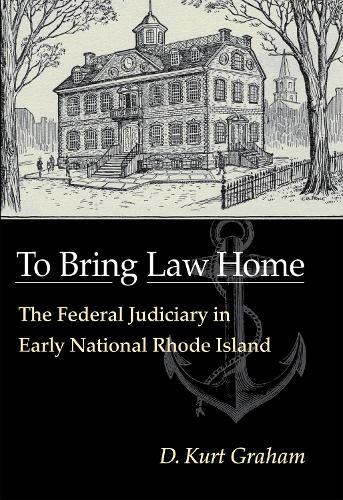Overview
In this original study, Kurt Graham sheds light on both an understudied institution and an underappreciated period in our nation's judicial history with an examination of the federal judiciary—the district and circuit courts—during the early national period. Using Rhode Island as a case study, Graham argues that the federal judicial system exerted a significant nationalizing influence on the citizens and states of the new American nation. Graham illustrates how the federal judiciary brought a federal presence and national authority to bear in Rhode Island, a state that had resisted federal union longer than any other. Rhode Island represents an ideal example: in part because of its initial resistance to federal union—a condition that made the national presence more conspicuous—and in part because of its heavy involvement in commerce. The national government's income came from customs duties, which gave Rhode Island and the federal courts there a significance they otherwise might not have had. The federal courts in Rhode Island highlight both the localized nature of national authority and the relative strength of the national government from its inception. The district and circuit courts have lived in the shadow of the U.S. Supreme Court and have been considered ""inferior"" courts in every sense. Beginning with Charles Warren's groundbreaking 1922 work, The Supreme Court in United States History, legal historians have focused on the significance of the Supreme Court, its decisions, and its justices. Because of this focus, the role of the lower courts—which is where most of the federal judicial activity took place in the early republic—has gone virtually unexplored. Graham contends that the lower federal courts were instrumental in establishing and maintaining national supremacy and in steadily enhancing the power of the national government. Legal historians and scholars of the early republic will appreciate this insightful book that opens a window onto an often overlooked aspect of U.S. history.
Full Product Details
Author: D. Kurt Graham
Publisher: Cornell University Press
Imprint: Northern Illinois University Press
Dimensions:
Width: 15.20cm
, Height: 2.20cm
, Length: 22.90cm
Weight: 0.454kg
ISBN: 9780875804149
ISBN 10: 0875804144
Pages: 194
Publication Date: 20 November 2009
Audience:
College/higher education
,
Professional and scholarly
,
Postgraduate, Research & Scholarly
,
Professional & Vocational
Format: Hardback
Publisher's Status: Active
Availability: In Print

This item will be ordered in for you from one of our suppliers. Upon receipt, we will promptly dispatch it out to you. For in store availability, please contact us.
Reviews
A superb, well-written, and much needed study of the early federal judiciary. It is a model of historical scholarship. -- Gordon S. Wood, Brown University, author of <I>Empire of Liberty</I> A fascinating book describing how the federal judiciary (looked upon by many during the debate over the ratification of the Constitution as a potential engine of despotism) was readily, easily, and overwhelmingly accepted in Rhode Island. Graham writes in an easily understood prose and avoids jargon. -- John Kaminski, University of Wisconsin-Madison Does much more than fill a major gap in the scholarship of the Early Republic. By showing how a state that rejected ratification of the Constitution quickly came to accept national authority and to favor federal courts over its own state courts, To Bring Law Home expands our understanding of law and the legal profession at a formative point in our history. -- David T. Konig, Washington University in St. Louis
A fascinating book describing how the federal judiciary (looked upon by many during the debate over the ratification of the Constitution as a potential engine of despotism) was readily, easily, and overwhelmingly accepted in Rhode Island. Graham writes in an easily understood prose and avoids jargon. - John Kaminski, University of Wisconsin-Madison
Author Information
D. Kurt Graham is the Housel Director of the McCracken Research Library and Co-Director of the Cody Institute for Western American Studies, both at the Buffalo Bill Historical Center in Cody, Wyoming. He holds a Ph.D. in American history from Brown University.




